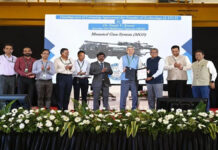NEW DELHI, OCT 3
On September 05, 2024, a committee of the Maharashtra Cabinet approved an investment proposal worth Rs 83,947 crore (US$10 billion) for a joint venture (JV) between Israel’s Tower Semiconductor and the Adani Group. This JV aims to establish a semiconductor chip manufacturing facility in Panvel, Maharashtra. This project is likely to be India’s second chip manufacturing facility and the sixth semiconductor plant in the country. While this proposal is one of the important developments in increasing India’s dominance in its manufacturing capabilities, the Government has been making a concerted effort to increase India’s semiconductor market by over 5x – from US$35.18 billion in 2023 to US$109.8 billion by 2030. This will ultimately help India build its domestic manufacturing capacities and realize its vision of becoming Aatmanirbhar Bharat.
In addition to the proposed JV between Israel’s Tower Semiconductor and the Adani Group to establish a semiconductor chip manufacturing facility in Maharashtra, under the Programme for Development of Semicon-ductors and Display Manufacturing Ecosystem (Outlay of Rs 76,000 crore), the Union Cabinet approved the proposal of Kaynes Semicon Pvt. Ltd. to setup a semiconductor unit in Sanand, Gujarat on September 02, 2024. The proposed unit will be setup with an investment of Rs 3,300 crore with an expected capacity of 60 lakh chips per day.
Currently there are 4 semiconductor units already under construction, which are expected to bring an investment of nearly Rs 1.5 lakh crore with a cumulative capacity of ~7 crore chips per day. With the addition of a fifth unit, the Government is taking another step to develop a vibrant semiconductor ecosystem in India. The 4 projects underway are as follows: Singapore’s established semiconductor ecosystem has produced a strong cluster of semiconductor companies, which are keen to participate in the growth of India’s semiconductor industry. With India aiming to establish itself as a global node for semiconductor manufacturing, driven by strong domestic demand in the electronics, electric vehicles, and manufacturing sectors, India and Singapore recently signed a Memorandum of Understanding (MOU) to partner and cooperate in the field of semiconductors.
Under this MOU, India and Singapore are expected to leverage complementary strengths in their semiconductor ecosystems and tap on opportunities to build resilience in their semiconductor supply chains. This will include Government-led policy exchanges on ecosystem development, supply chain resilience, and workforce development. The Ministry of Trade and Industry (MTI) and India’s Ministry of Electronics and Information Technology (MeitY) will establish a Policy Dialogue to facilitate discussions, oversee the implementation of the areas of collaboration.
, and exchange best practices.
Bolstering manufacturing activity in high-tech sectors such as semiconductors not only provides a significant source of high-value-added, high-paying employment opportunities, but can produce significant employment, and economic, multiplier effects. For example, as per Information Technology & Innovation Foundation (ITIF), in the United States (US), the semiconductor industry’s jobs multiplier is 6.7, which means that for each US worker directly employed by the semiconductor industry, an additional 5.7 jobs are supported across the wider US economy.



























